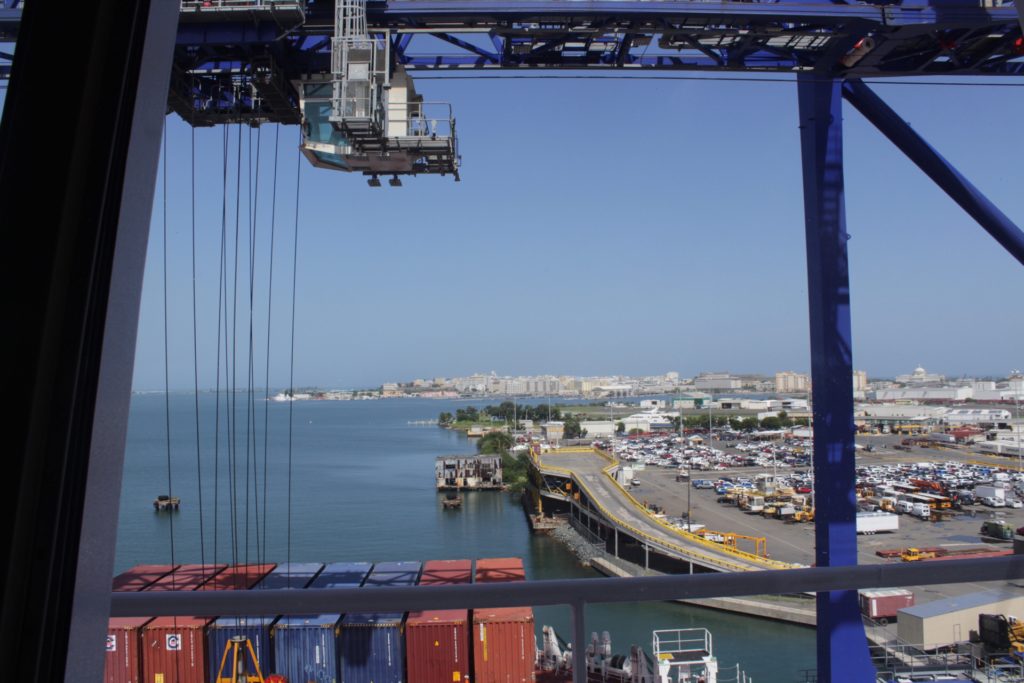I recently joined a group of center-right bloggers and journalists on a reporting trip to Puerto Rico examine the status of the Jones Act and how the law is aiding relief efforts there following the aftermath of Hurricane Maria.
President Trump was reluctant to waive the Jones Act following Hurricane Maria, but later did for ten days. Outlets like Reason Magazine said the waiver didn’t go far enough. The topic has been in the news, so I wanted the opportunity to see it for myself despite media reports projecting doom and gloom.
During the course of the reporting trip, we heard from a series of speakers from the shipping industry to get their take on the law and the status of their industry.
What is the Jones Act?
The Jones Act, or the Merchant Marine Act of 1920, is a law that governs cabotage laws in the United States. It was named after Senator Wesley Jones (R-WA). Cabotage laws trace back to 1789 when Congress imposed added duties on goods transported by foreign vessels.
Section § 861 of the Jones Act reads, “It is necessary for the national defense and for the proper growth of its foreign and domestic commerce that the United States shall have a merchant marine of the best equipped and most suitable types of vessels sufficient to carry the greater portion of its commerce and serve as a naval or military auxiliary in time of war or national emergency, ultimately to be owned and operated privately by citizens of the United States.”
Misconceptions About the Jones Act
There are many misconceptions placed on the Jones Act in its current standing.
First, I was surprised to learn that the godfather of free enterprise himself, Scottish economist Adam Smith, supported British cabotage laws that mirror today’s Jones Act. Adam Smith wrote on cabotage laws as follows:
The defense of Great Britain, for example, depends very much upon the number of its sailors and shipping.
Second, the shipping industry flourishes due to the law. I had no idea the current domestic fleet comprises over 40,000 vessels. Nor was I aware that domestic maritime economy supplies half a billion jobs and contributes $92.5 billion to the economy—meaning for every job created under the law, five jobs are subsequently created in other economic sectors. Our group learned that top states that are directly impacted by the Jones Act are Louisiana, Florida, Texas, California, New York, Washington State, Illinois, Virginia, and Tennessee.
Third, unlike most industries in the U.S. today, shipping is uniquely without subsidies. Our two top competitors, China and Korea, heavily subsidize their maritime industries— the former investing $40 billion, the latter investing $11 billion in new ship construction.
Consequences of Repealing the Jones Act
If the law were to be repealed, the consequences would be especially dire.
First, domestic shipbuilding would take a hit if the Jones Act were to be overhauled. All shipbuilding personnel wouldn’t be American and ships wouldn’t be made in the U.S. More importantly, American cabotage laws would suffer due to a loss in specialized skill sets, ship building venues, facilities, and other components essential for transporting cargo between U.S. ports.
Secondly, shipping costs wouldn’t go down despite arguments in favor of undoing the Jones Act. A 2013 Government Account Office (GAO) report on the Jones Act suggests claims that shipping costs would be reduced if this law were to be repealed are “highly uncertain.” Here are the GAO report’s findings:
The effects of modifying the application of the Jones Act for Puerto Rico are highly uncertain*, and various **trade-offs could materialize depending on how the Act is modified*. Under a full exemption from the Act, the rules and requirements that would apply to all carriers would need to be determined. While proponents of this change expect increased competition and greater availability of vessels to suit shippers’ needs, it is *also possible that the reliability and other beneficial aspects of the current service could be affected**.*
Third, the national security implications would led to greater security breaches across our waterways and fewer vetted American mariners to perform these tasks—leading to an absence of a line of defense essential to protecting shipping and American consumers. As a result, most top U.S. generals and transportation experts have come out in defense of the Jones Act.
Touring a Jones Act Cargo Ship
In addition to learning more about the Jones Act, our group visited a cargo ship in the Port of San Juan.
Many believe Puerto Rico’s woes are attributed to the Jones Act, despite long-standing corruption on the island. However, during a presentation by a shipping industry professional, we learned that the industry helped with relief efforts on the island.
Before entering the cargo ship, our group was instructed to take some safety precautions since the terminal has lots of dangerous equipment on hand. The vessel were we toured specifically transports cars between Jacksonville, FL and San Juan, Puerto Rico.
It isn’t enough to study the theoretical claims about the Jones Act until you see it for yourself. I believe most misconceptions originate from failure to see things first hand, which is often the case on this issue.
I hope this piece allows readers to examine the Jones Act in a new light if they haven’t before.
What did you think of this piece? Am I on-target or off-mark?
As always, I recommend you follow me on Facebook, Twitter, Instagram, and YouTube to stay in the loop with my musings. Subscribe to my newsletter–now LIVE. Chime in below with your comments!

